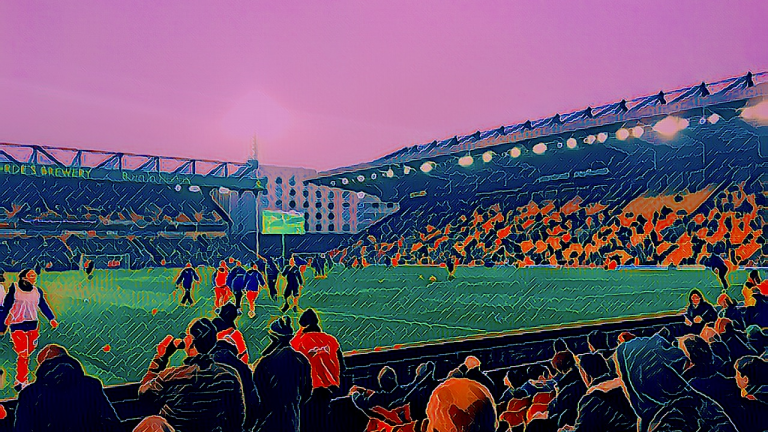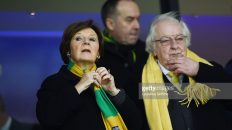Rewind 15 months.
Norwich was enduring their first season in the Championship following relegation. Promotion at the first attempt became impossible, players on high wages weren’t performing effectively and the club lacked clarity over the direction it was heading in.
With very few academy prospects beyond the Murphy twins emerging, caretaker manager Alan Irvine bemoaning the lack of young talent at his disposal and the lack of it coming through the ranks at Colney, it seems almost inconceivable to imagine a situation where the club would be embedding young operators with confidence and through choice on a regular basis in the way they are currently.
Norwich City required reinvigoration.
There was a hierarchy at the club, with only a few key operators making the critical decisions that impacted the football club long term. Something had to change, this football club could no longer carry on operating in the manner in which it did.
It wasn’t the easy option, the club could have opted to continue down the same path, but they were proactive. This wasn’t about re-inventing the wheel but was about constructing a working method that suited their desire to be self-sustainable. They were prepared to revert away from the safety net of operating with a conventional manager and chief executive.
Key protagonists held discussions with reputable people in the game before tabling it to the club’s top brass. It was a decision that required bravery and courage but even more so in the last campaign, when supporters were becoming agitated with the lack of excitement on the pitch.
If anybody wants a graphic illustration of the difference in operations between Norwich City and Ipswich Town, there it is. The latter appointed an inexperienced manager and gave him a carte blanche to implement their plan, by August, they had a completely different squad and signed a then 34-year-old in Jonathan Walters.
Quite different from the ‘young and hungry’ mantra previously proclaimed by their owner. Suddenly a plan was abandoned simply because of a poor start.
Contrast this to the system in place at NR1. The Sporting Director and Head Coach relationship remove all sense of hierarchy. The workings of the club no longer have to marry up to the ego of the persons in charge but is now reliant on communication and a need to work collectively rather than individually. They maintained their transfer policy, whilst retaining their ethos, even despite a poor initial season and fan scrutiny.
Now all can see the rewards, but it wasn’t always that way.
On these very pages, tough questions were asked. If they were extracted and analysed now, they would probably appear comical, but the level of scepticism around the club was at boiling point after a relatively indifferent start to the campaign. For the transition into a new approach, those in the boardroom deserve an immense amount of credit.
Cut back to the current climate and Norwich now feels like a club who are constantly problem solving, both on and off the pitch.
Last campaign, for example, Norwich lacked goals so those in the corridors of power, they sought to respond by recruiting prolific and seasoned Championship operator Jordan Rhodes and also by taking a calculated gamble on a free-scoring striker playing in Denmark.
Proactivity rather than responding when the problem magnifies.
Prior to the appointment of Stuart Webber and Farke, supporters lacked connection with the team they were witnessing on the pitch. That disconnect resulted in an apathetic viewing position where they were left to feel isolated from the players.
That’s a divide that isn’t simple to resolve.
Installing a togetherness wasn’t a soundbite adopted to create a synthetic sense of positivity but has become a crucial strategy of how the football club elects to operate, opting to be progressive and transparent where once it was not. Supporters have been given a voice to suggest improvements or critique, that’s pivotal to a football club succeeding.
Ambition has returned also; there is no cap on what can be achieved and psychologically, that can only prevent self-doubt among players and breed a sense of self-confidence and a lack of limitation. As such, young players are given a platform that raises their belief whilst presenting freedom for them to operate.
Suddenly, if you’re an academy prospect playing for the U13’s, you can see a pathway that concludes with the opportunity of first-team football at a club that is keen to develop talent. It places the opportunity firmly at the player’s door because they know that intense, relentless hard work and dedication result in being rewarded with the potential dream of first-team football becoming a reality.
This club is giving a platform to young players, that’s an attractive characteristic.
For those operators’ parents, they can rest assured that their children will be educated both academically and as people, with core skills such as cooking being taught. It seems such a small thing, but it matters a great deal.
In the last two years, Norwich has become a leading force in the fight for safe standing, they are a glowing example for how teams can introduce young talent from their academy whilst sitting at the top end of their division without spending a truckload of money.
Norwich is bucking the trend.
However this season ends, be it with the celebration of promotion with the elation it brings or the disappointment of missing out, they will continue their approach and go again next season. They now have a contingency plan for whatever decision. Recruitment will be aggressive and now they know what they want from the market.
No more will this football club spend vast sums and high wages on players if they aren’t in the position to do so. Naturally, they will favour quality, ensuring they get more bang for their buck.
With the colour of Carrow Road becoming more prominent with every home fixture and the addition of flags, scarves and chants, the belief has been restored in Carrow Road and beyond. Everyone is now united, pushing in the same direction and standing together despite the adversity being constantly pushed into their path. Crucially, supporters are so proud of their team again.
It feels like they are a healthier, more transparent football club keen to be proactive in all areas and adopt a contemporary approach to help push them in the right direction.
That’s something everyone can get behind.







Enjoyable article Mr Southwell.